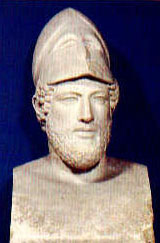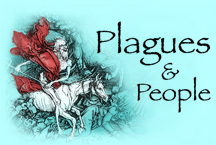 |
Pericles |
They had been possessed, by Pericles' enemies, with the
belief that the plague was due to the crowding of the country people together
into the town. There, the masses were forced, in the heat of the
summer weather, to dwell crammed into small tenements and stifling hovels,
and to be tied to a lazy indoor lifestyle, whereas before they lived in
a pure, open, and free air. The cause and author of all this, said
they, is he, Pericles, who on account of the war has poured a multitude
of people in upon us within the walls, and who has no useful employment
for all these men that he has here, but keeps them pent up like cattle,
to be overrun with infection from one another, and affording them neither
shift of quarters nor any refreshment.
To remedy these evils, and do the enemy some inconvenience, Pericles got a hundred and fifty galleys ready, and having embarked many veteran soldiers -- both foot and horse -- was about to sail out, giving great hope to his citizens, and no less alarm to his enemies, upon the sight of so great a force....
However, after putting out to sea, Pericles' exploits seem not to have
been equal to his preparations. He laid siege to the holy city Epidaurus,
which gave him some hope of surrender, but his plans miscarried by reason
of the sickness. For it not only seized upon the Athenians, but upon
all others, too, that had any sort of contact with the army.
After this, the Athenians were highly displeased with him, and Pericles
tried to appease them. But he could not pacify them or allay their
anger, nor persuade or prevail with them any way. In the end, they
freely passed their votes upon him, resumed their power, took away his
command from him, and fined him a large sum of money....
Even though his public troubles subsided, his personal life was in an
unhappy state. Many of his friends and acquaintances had died in
the plague, and his family relationships had long since been in disorder
and in a kind of mutiny against him.
For the eldest of his lawfully begotten sons, Xanthippus by name, being
recklessly wasteful by nature ... openly reviled his father. This
difference of the young man's with his father, and the breach between them,
continued never to be healed or made up till his death. For Xanthippus
died in the plague time of the sickness. At which time Pericles also
lost his sister, and the greatest part of his relations and friends, and
those who had been most useful and serviceable to him in managing the affairs
of state.
However, he did not shrink or give in upon these occasions, nor betray
or lower his high spirit and the greatness of his mind under all his misfortunes;
he was not even seen to weep or to mourn, or even attend the burial of
any of his friends or relations, till at last he lost his only remaining
legitimate son. Subdued by this blow, he strove, as far as he could,
to maintain his demeanor, and to preserve and keep up the greatness of
his soul. However, when he came to perform the ceremony of putting
a garland of flowers upon the head of his son's corpse, he was overcome
by his passion at the sight, so that he burst into exclamations, and shed
copious tears, having never done any such thing in his life before.
The city needed new generals for the conduct of war, and orators for
business of state, but they found there was no one who was of weight enough
for such a charge, or of authority sufficient to be trusted with so great
a command. Then they regretted the loss of [Pericles], and invited
him again to address and advise them, and to reassume the office of general.
He ... lay at home in dejection and mourning; but was persuaded by Alcibiades
and others of his friends to come out and show himself to the people; who
having, upon his appearance, made their acknowledgments, and apologized
for their untowardly treatment of him he undertook the public affairs once
more....
[Then] the plague seized Pericles, not with sharp and violent fits,
as it did others that had it, but with a dull and lingering distemper,
attended with various changes and alterations, leisurely, by little and
little, wasting the strength of his body, and undermining the noble faculties
of his soul. So that Theophrastus, in his Morals, when discussing
whether men's characters change with their circumstances, and their moral
habits, disturbed by the ailings of their bodies, start aside from the
rules of virtue, has left it upon record, that Pericles, when he was sick,
showed one of his friends that came to visit him an amulet or charm that
the women had hung about his neck; as much as to say, that he was very
sick indeed when he would admit of such a foolery as that was.
When he was now near his end, the best of the citizens and those of
his friends who were left alive, sitting about him, were speaking of the
greatness of his merit, and his power, and reckoning up his famous actions
and the number of his victories; for there were no less than nine trophies,
which, as their chief commander and conqueror of their enemies, he had
set up for the honor of the city....
He was indeed a character deserving our high admiration not only for
his equitable and mild temper, which all along in the many affairs of his
life, and the great animosities which he incurred, he constantly maintained;
but also for the high spirit and feeling which made him regard it, the
noblest of all his honors that, in the exercise of such immense power,
he never had gratified his envy or his passion, nor ever had treated any
enemy as irreconcilably opposed to him. And to me it appears that
this one thing gives that otherwise childish and arrogant title a fitting
and becoming significance; so dispassionate a temper, a life so pure and
unblemished, in the height of power and place, might well be called Olympian....
|


